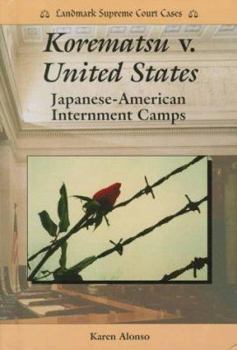Korematsu V. United States: Japanese-American Internment Camps
This book looks at the people behind Korematsu v. United States, the landmark Supreme Court case that challenged the U.S. government's decision to imprison Japanese citizens and non-citizens during... This description may be from another edition of this product.
Format:Hardcover
Language:English
ISBN:0894909665
ISBN13:9780894909665
Release Date:January 1998
Publisher:Enslow Publishers
Length:128 Pages
Weight:0.85 lbs.
Dimensions:0.5" x 6.3" x 9.3"
Age Range:11 to 17 years
Grade Range:Grades 6 to 12
Related Subjects
Children's Children's Books Education & Reference Ethnic & National History JapaneseCustomer Reviews
3 ratings
Bizzare Twist in the Law
Published by Thriftbooks.com User , 18 years ago
Government Argument 1: Korematsu should not be allowed to challenge internment at all because he did not raise the issue at his original trial. The government charged Korematsu only of being in a military area after the date set by the Army to evacuate. Separability requires that all complaints must arise in the initial trial and cannot surface later during appeals. Korematsu did not bring up the internment part of the program during his initial trial and the defendant loses the right to raise it during a later appeal. Korematsu planned on leave for Nevada and marry his girl friend, but when she began having second thoughts about leaving her family, Korematsu remained in the military area. Korematsu took up residence at a hotel, changed his name, and claimed to be Mexican - Hawaiian ethnicity. A patron, who recognized Korematsu, notified the police and the police arrested him for violating law 503. The court did not reverse Korematsu case. Instead, Korematsu was sentenced to five year of probation. Upon Korematsu's release the Army detained and interned him to Tanforan with the rest of his family, a person now with a criminal record and force internment. The government argued that internment was necessary step for evacuation. Japanese in the military area were considered "the enemy" and a danger to industrial production necessary for the war effort. Historical suspicion and distrust of the Japanese had been a problem: denial of citizenship for all Japanese born immigrants, denial of property ownership, and denial of marriage to Caucasians. The government claimed lack of ability in determining which Japanese were Loyal and disloyal. The government said it could compromise national security if Korematsu were allowed to disobey the evacuation order because of what he felt was an unconstitutional internment order. The only issue for Korematsu was detention; did the government have the right to detain him for violation of law 503. In 1983, Korematsu was shown research evidence indicating that the Japanese people would have remained quiet and there was no threat of violence or danger. The case was reverses. Government Argument 2: Internment was not even an issue in Korematsu's case. The court said that internment removed the Japanese away from aircraft factories. Government Argument 3: Evacuation and internment were simply used as a way of keeping safety and order on the West Cost. The army provided the most orderly and efficient means of moving a 120,000 Japanese to ten internment camps in a short period of time. The government claimed the Japanese were safer in internment camps because the state police could protect them against hateful racism and violence. Government Argument 4: The War Power Clause of the United States Constitution allows special measures in order to win a war. The fourteen amendment of equal protection of the law did not apply to the Korematsu case. Korematsu Argument 1: Constitutional Law comes from D
Recommended for adults as well
Published by Thriftbooks.com User , 19 years ago
I am an educator and have read several books in this series and I highly recommend it. A lot of Americans seem to be unaware of the extent of the Japanese internment during WWII. For example that not only were many of them US citizens but many others would also have been citizens were it not for the Exclusion Act. The author points out that while there were curfews for those of German and Italian decent they were not singled out as traitors who deserved internment. Many of the statements made against Japanese Americans by high ranking goverment officials were very racist, but at the time expressed popular sentiment. Those who were interned were forced to sell their all of the property with about a week's notice and general for pennies on the dollar. This book is basically a brief presentation of the facts. The author tries to present all sides. Dates and names of court decisions are given. Legal jargon is explained. The subject is followed from the eve of WWII right up to the Reparations Act of 1988. There is a final chapter about prejudice in general in which the author gets a bit emotional uses inductive reasoning. I also got a bit confused reading the dissenting judges' opinions and the index could have been a bit more inclusive, otherwise it's an excellent book.
Basic Knowledge- Japanese internment camps
Published by Thriftbooks.com User , 25 years ago
This book is valuable, not solely for it's specific court case, but also for its abundance of beginner information on Japanese internment camps. "Korematsu" is definately written for young readers, but if anyone older can look past the very simple language, it is great for an introductory book. Especially since books on this subject are so rare. Really, it left me thirsting for more advanced information on the subject of Japanese internment camps. This book could definitely be a productive teaching tool for students of elementary school through junior high school.






